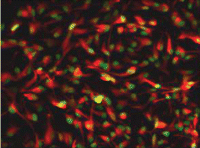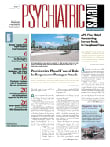During the past few years, it has become apparent that antidepressants activate the birth of new neurons in the hippocampus. But how do they do it?
Via glucocorticoid receptors present on hippocampal neural progenitor cells, British scientists have found.
The findings also have clinical implications, the scientists believe. Glucocorticoid receptors on hippocampal neural progenitor cells might offer a novel target for the development of new, more effective antidepressants.
The lead investigator was Christoph Anacker, a doctoral student at the Institute of Psychiatry, King's College, London. The senior investigator was Carmine Pariante, M.D., Ph.D., a reader in biological psychiatry at the Institute. The results appeared in the July Molecular Psychiatry.
Glucocorticoids are a class of steroid hormones, such as cortisol, that regulate the metabolism of glucose. They exert their effects through the glucocorticoid receptors. Anacker and his group had previously found that antidepressants influence the function of glucocorticoid receptors. So this time they looked to see whether glucocorticoid receptors might be involved in antidepressants' ability to stimulate nerve generation in the hippocampus.
They cultured hippocampal neural progenitor cells, then exposed them to the SSRI sertraline. They found that the treatment not only stimulated the cells to differentiate into nerve cells, but that it evoked certain changes in glucocorticoid receptors present on the cells, for example, in the receptors' phosphorylation by cyclic AMP-protein kinase activities. They also found that when they added a glucocorticoid receptor antagonist to their culture, the SSRI-prompted nerve differentiation effect was abolished.
These findings, they concluded, suggest that glucocorticoid receptors are pivotal to antidepressant-induced hippocampal formation of new neurons.
Yet if glucocorticoid receptors are crucial for antidepressant-induced hippocampal nerve differentiation, then why is this the case?
"Glucocorticoid receptors, it is true, are receptors for glucocorticoid hormones, yet while these hormones are involved in glucose metabolism, the receptor is not itself affected by glucose," Pariante told Psychiatric News. "So glucose is unlikely to be the mechanism. On the other hand, the glucocorticoid receptors are also transcription factors—that is, they regulate the synthesis of other genes. What likely happens is that antidepressants activate the glucocorticoid receptors, and the receptors in turn increase the synthesis of genes that increase neurogenesis."
In an interview, still another possible scenario was suggested by Maura Boldrini, M.D., Ph.D., an assistant professor of psychiatry at Columbia University and an expert on the subject. "Stress is known to reduce hippocampal neurogenesis throughout species.... Antidepressants have shown a significant role in reversing the negative effect of stress on neurogenesis.... Therefore the study by Anacker et al. confirms in human progenitor cells that one of the mechanisms of action of antidepressants on neurogenesis might be via the reversal of the glucocorticoid receptor changes induced by stress. Such a finding should be confirmed in postmortem human brains comparing subjects with mood disorders treated with antidepressants and untreated cases."
Whether either of these explanations is correct, the findings definitely have clinical implications, Pariante said. The glucocorticoid receptors on the hippocampal progenitor cells offer "a novel potential target for the development of new and more effective antidepressants."
The study was funded by the Institute of Psychiatry, the South London and Maudsley National Health Service Foundation Trust, the United Kingdom Medical Research Council, and the Commission of European Communities.

